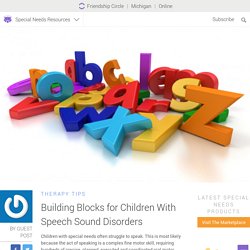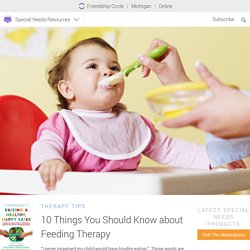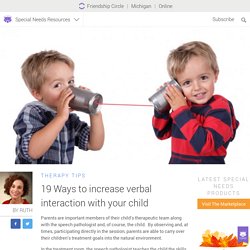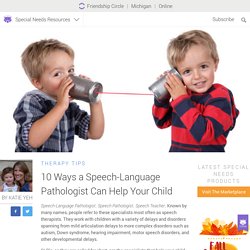

Typical Speech and Language Development. What Is Speech?

What Is Language? Learn the difference between speech and language. How Does Your Child Hear and Talk? Charts of speech, language, and hearing milestones from birth to 5. Includes tips for parents. Early Identification of Speech, Language and Hearing DisordersInformation and tips for parents, families, and caregivers. Communication Development: Kindergarten–5th gradeWhat to expect from children in elementary school. Reading and Writing (Literacy)Learn about how reading and writing develops. Building Blocks for Children With Speech Sound Disorders - Friendship Circle - Special Needs Blog. Children with special needs often struggle to speak.

This is most likely because the act of speaking is a complex fine motor skill, requiring hundreds of precise, planned, executed and coordinated oral motor movements, which are expressed as vowels and consonants. A great deal of practice is needed for words to become automatic and spoken with ease, fluent and intelligible. Choosing words for practice can seem like an insurmountable task. 10 Things You Should Know about Feeding Therapy - Friendship Circle - Special Needs Blog. “I never imagined my child would have trouble eating.”

Those words are often one of the first comments parents have for me when they ask about feeding therapy. As a pediatric speech pathologist who specializes in feeding, I have the joy of being a “food coach” for kids and their families as we progress through the developmental process of learning to eat a variety of foods. Whether working with children with special needs such as Autism Spectrum Disorders (ASD), Down syndrome or Sensory Processing Disorder (SPD) or with a child coined the “picky eater” of the family, the ultimate goal of feeding therapy is to establish regular, nutritious family meals that are joyful for the entire family. Here are the top 10 things I want you to know before starting feeding therapy: 1. Typically conducted by a speech language pathologist or occupational therapist who specializes in feeding and swallowing difficulties in children, these evaluations can be done in a variety of settings. 2. 3. 4. 5. 6. 7.
19 Ways to increase verbal interaction with your child - Friendship Circle - Special Needs Blog. Parents are important members of their child’s therapeutic team along with the speech pathologist and, of course, the child.

By observing and, at times, participating directly in the session, parents are able to carry over their children’s treatment goals into the natural environment. In the treatment room, the speech pathologist teaches the child the skills needed to attain receptive and expressive language skills appropriate for their age or the highest level the child can reach. It is crucial that the child practice these new skills outside the treatment room with a variety of people. The parents’ help is necessary, as they are with their child at home and in the outside world. Frequently, parents have a difficult time coming up with ways to interweave their child’s targeted goals into their daily lives.
How to Build Speech & Language Practice into Your Child’s Day - Friendship Circle - Special Needs Blog. Speech-language pathologists know that building time into the day to do therapy-related homework can be a struggle, especially on top of work assigned by your child’s school.

Luckily, scripting – possibly the most important piece of homework – can be easily integrated into your everyday life. Scripting can be done repeatedly and on a daily basis, which is best for learning new skills. What is Scripting? Scripting is an adult-directed method of providing children with childhood apraxia of speech (CAS) and expressive language challenges with functional verbal communication. It is a wonderful way to help them to obtain the items/actions that they most desire. “Use your Words” Frequently, these children do not have either the words or the motor planning to construct whole sentences to request items or activities.
Scripting can also help with one-word requests such as “cookie.” What happens within the Interactions? Within each interaction, several steps should occur (with examples): Five Ways to Get Siblings Involved in Speech Therapy - Friendship Circle - Special Needs Blog. How does your child feel when their sibling gets speech and language therapy and they don’t?

Does your typical child ever feel left out? As both a parent and therapist, I have understood the challenges of dealing with this issue. I have seen siblings act out because they may feel left out, jealous or even simply confused why someone comes to play with their sibling, but not them. As parents, it’s difficult to understand this perspective since we understand the intentions of the speech language pathologist. From a child’s perspective, they might be thinking, “Why is this fun person coming to play with my sibling, but not me?” As a therapist, I have always tried to involve a sibling in therapy if appropriate and beneficial to the child receiving the services.
29 Milestones for Speech and Hearing Development - Friendship Circle - Special Needs Blog. May is Better Speech and Hearing Month.

What does that mean to you as a parent? If you are having doubts about your child’s speech and language development, wondering if your child is reaching those speech milestones on time, questions are probably swirling in your mind: Do they have enough words in their vocabulary? Do they understand language? Are they attempting to interact with others enough? Here are some of the developmental speech behaviors of young children that you should be watching for: Child (0-12 months) Responds to/turns toward a familiar voiceShows recognition of nameListens to words, begins responding to wordsEntertains self by vocalizing (babbles, coos)Babbles at othersTries to imitate a single syllable or series of soundsExhibits expressive jargon (gives impression that vocalizations have meaning) Child (12 months-24 months) Follows simple questions or commands (Where’s the ball?
10 Ways a Speech-Language Pathologist Can Help Your Child - Friendship Circle - Special Needs Blog. Speech-Language Pathologist.

Speech Pathologist. Speech Teacher. Known by many names, people refer to these specialists most often as speech therapists. They work with children with a variety of delays and disorders spanning from mild articulation delays to more complex disorders such as autism, Down syndrome, hearing impairment, motor speech disorders, and other developmental delays. SLP’s, as they are called for short, are the specialists that help your child with speech, talking and communication. 10 Things to Tell Parents When It's Time to Dismiss (And They're Not Ready!) - Speech is Beautiful.
Dismissal from speech therapy can feel like a huge celebration for both the student and the speech pathologist, but some parents don’t see it that way.

It can be the end of a journey for parents and they may not feel ready to let the child leave speech therapy. I’ve seen this many times and here the things that I tell parents at dismissal time so that they feel on the same page as me… Speech Therapy Worked! When I first became a speech pathologist in Chicago public schools, I was working with the lead speech pathologist to evaluate a student who was coming out of the early intervention. The student presented with no speech impairment at all during the evaluation. I hope my ideas have helped you when you have to tackle the issue of dismissal with parents. 10 Facts for Families New to Speech and Language Services.